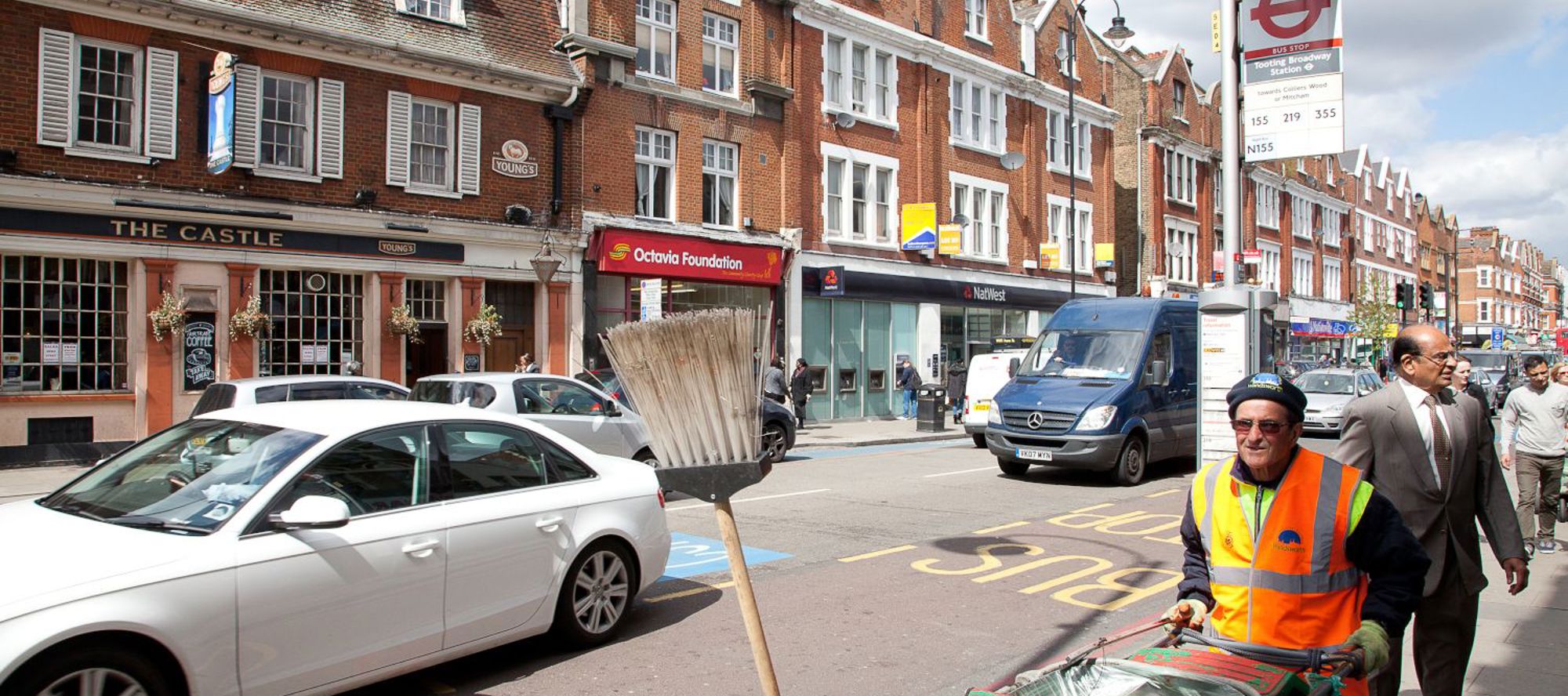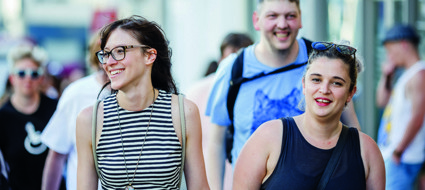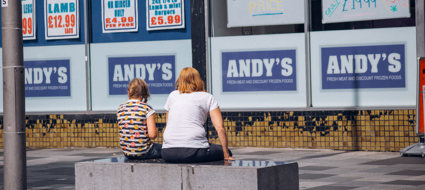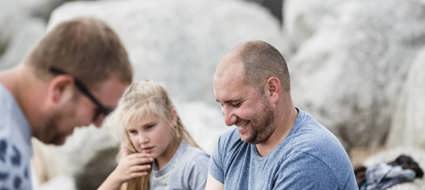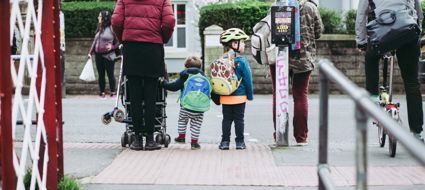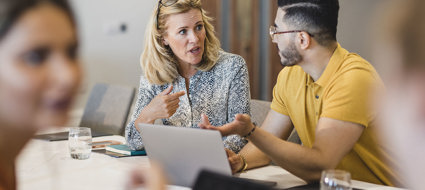Community development work: The approach in Camden Council
Published:
This podcast looks at Camden Council's role in community development, relational activism, and how the strength of the community has helped to mitigate the impact of COVID-19.
Dyfrig Williams, Learning Events Co-ordinator at Research in Practice speaks to Becca Dove, Head of Family Support and Complex Families, and Tim Fisher, service manager for Family Group Conferencing and restorative practice at Camden Council.
They talk about the council’s role in community development, relational activism, and how the strength of the community has helped to mitigate the impact of COVID-19. This is the first in a series of podcasts on the topic of community development.
[Introduction]
This is a Research in Practice podcast, supporting evidence-informed practice with children and families, young people, and adults.
Dyfrig: Hello, my name is Dyfrig Williams, I'm the learning events coordinator here at Research in Practice. In this podcast, we're going to be talking with Becca Dove and Tim Fisher of Camden Council about their approach to community development. So, I thought it would be, you know, a good place to start to think about actually how do you define a community?
[Defining community]
Becca: Thanks for having us, Dyfrig. I thought really hard about this question, because Tim and I have just come off a call with, I think, eight or nine community organisations in Camden, where we were talking about storytelling and amplifying the voices of families, their experience during this crisis, their hopes for the future after this crisis. And I knew we would, kind of, come straight onto this call, and I was reflecting on how even that conversation that we just had, Tim and I, with those groups, it felt very much like a community. A community who shared some sense of connection, some sense of affection with each other, who were all really committed to wanting similar things, although each using their own unique approach. And I think we often think of community as being geography, we tend to hang on to that idea of geography and proximity as being the way that we think about community, but even that call, we felt like a community amongst ourselves. And it made me question, really, whether a community just means having a place to belong, a place that you feel affection for, a place where you feel you have some sense of being shared, of being valued, of being listened to, and so on. One of my current favourite books, by Professor Jon Lawrence, called Me, Me, Me, where he explores the history of community in trying to de-bunk some of the myths that it is all about geography. And he talks a lot about community being about mutuality, about community being affection, and that can be online, that can be where I live, it's a very multi-layered concept, I guess.
Tim: Well, you know, with what Becca's just been saying about community being an imagining, one of the ways in which we've been imagining the Camden community recently is thinking and talking about it as a village. I like that idea because the word 'village' feels relatable and inclusive, and at the moment I think in particular it's good to try and consider the whole thing, to try and care for the whole, to sort of, cherish everything and everyone, if we can, around us. And the village is a nice imagination and a way to do that. So I, sort of, feel like in taking a community development approach to early help and to social work, you've got to really be-, place yourself, position yourself and your service in that community space, in that village, and really prepared to meet people in the crossroads, in the intersections. And as Becca just said, you know, community, it's not just us as council officers thinking that that's the thing out there, it's actually the intersection of all the people in and around-, the helpers and people that are being helped. And those denominations switch around, you know, with the mutuality and the flow of time.
[The approach in Camden]
Dyfrig: How did your approach come about? You know, it seems quite different to a traditional approach that other local authorities might take, so how did all this start?
Becca: When we were thinking about prepping for this podcast, I was reminded of sitting in Holborn Library, I spent an entire afternoon in Holborn Library with the most wonderful person called Tudor Allen, who runs the archives over there. And Tim and I had been told about a scheme in Camden in the 1960s, which was essentially family fostering, I guess, it was support for a whole family in what we would understand today that would be fostered, but during the day. It wasn't a placement, it was a family taking care of a family and supporting a family. And that, kind of, delve into the archives, it really reminded me that we are standing on the shoulders of giants, there were people that were doing this and thinking this way long before us in Camden, we're just the latest chapter, I think. But you can see the roots of this right the way back in those committee papers and in those reports from the very early days of Camden Council when it came together as an entity in the '60s. And I've commented as well that I think Camden as a council should be reflective of the values that are alive in its citizenry already, you know, I don't think this is something that the council thought up. The council, quite rightly, sees those values of activism, and mutuality, and care, alive in its citizens in Camden. And not all equally experienced, you know, that's always an issue, but I think that Camden really wanted to reflect those values, as indeed it should as an enabler, as a facilitator, not just as a provider of services or a commissioner of services.
So, I think it's come about over a long history, but also a recognition that citizens lead decision-making around that, citizens should inform how you feel about yourself as an organisation. And certainly I think that's an ethic that Tim and I, in early health and social work, have always tried to stay true to and try to honour.
Tim: And there's somebody that me and Becca both know that really has exemplified that recently for me, and it's someone that-, she lives in one of the hostels, like, short-term housing, and has been really helping fundraise at that place to help other families and people recently. She's also been doing some grassroots advocacy for other parents that live in that place, and starting various local campaigns for things that they need. And so she really is an activist, and she's also got this relationship with the council, and so she's intersecting with council services in different ways, and, kind of, being influential and supporting people around her. So, Becca and I, sort of, use this term 'relational activism' and we've identified some relational activists along the way, and she's most definitely one of those.
[Relational activism]
Dyfrig: Can you tell me a little bit about what you mean by 'relational activism'? Because obviously you and Becca have done some great work on that.
Becca: I really want to quote one of our favourite parent activists, an extraordinary woman called Clarissa Stevens, but it would involve me swearing, where she basically says that relational activism is-, I'm not going to swear, is just giving a damn about other people, it's not complicated. But it's essentially just remembering that we have enormous power in our relationships, in the people around us, in the world we can touch to effect change. And I think sometimes when you're stuck in systems that don't feel relational, or feel quite sterile, or don't feel fair, and when, you know, you're faced with the enormity of social inequity, and social justice, and human rights, it can be really easy to feel very paralysed by that, and think, 'I can't do anything to help.' But I think whenever we write about relational activism, we'd always try and give really live examples, and we've seen time and time and time again that social workers, family workers, people in the community, young people, older people, have enormous ability to effect change by changing the world around them, by changing the world they can touch. And one of the examples we gave in a recent piece for Bristol University Press, we wrote for Transforming Society, we talk about an incredible guy called Dave Jones, who's a butcher in Dewsbury. And Dave offered his local community-, he could see that many families were struggling with the cost of school uniforms, so he just put a shout-out on social media, offering to purchase a set of school uniforms for a couple of families, and let him know if anybody wanted it.
Now, that produced two things, firstly, the social media got an enormous response from other people in Dave's local area who said, 'What a wonderful idea, I can do that too,' and so more and more and more and more people joined in as a result of Dave reaching out with that offer. But the second thing that happened was because it got some traction, the local press picked up the story, then the national press picked up the story, and then Dave's MP subsequently took it to parliament and raised it there. And so from one person thinking, 'I can make a small difference to a family,' there was a cumulative effect of lots and lots of people joining in and taking part, and, kind of, seeing some inspiration from others.
Tim: I think to link it with what you said earlier, Becca, about taking the long view. One thing that we would say, and perhaps recommend strongly, is finding leadership in the community. And the fact that leaders, that experts by experience, that relational activists, are really all around us and can often give perspectives, and some provide some element of renewal and imbuing meaning into what we're all doing together. And we've got a current situation where people are perhaps taking a different view of the state and of the key workers and state services. Some are clapping on doorsteps, some are donating money, I've heard that some social work courses are experiencing a rise in applications, so, you know, there are different ways of viewing those developments. But taking an optimistic view, it would seem that people are associating themselves more with their communities, and are, sort of, including themselves more in the villages around them.
[The role of the local authority]
Dyfrig: That's really interesting, you know, what you're talking about in the power inherent in community. What do you see as Camden's role in that? What is the role of a local authority in this scenario?
Becca: That's an enormous question, isn't it? I'm trying to mentalise what our council leader Georgia Gould might say in response to that question, and I think she would say that a huge part of your job is to sometimes get out of the way. I think sometimes she might say it's about being an enabler and opening up those spaces, and not thinking that you have all of the answers all of the time. I think she would say it's to join in, I think you can be a leader and join in. And getting alongside your community and seeing yourself as a part of the community, as opposed to above the community or, you know, telling the community where to go, I think that's one thing that I really admire about how Georgia's approached all of this. And indeed, previous leaders before her, is that they've always tried to locate the local authority as joining in with the community, lending hands and hearts to a collective effort. And yes, providing leadership within that context, but being really tapped in to what the community want, and what they care about, and where they see the future of this really rather special place going. I can't speak for her, but that's what I imagine she might say.
[Ways of working with people in the community]
Dyfrig: That's great. I'm, kind of, left wondering here, you've talked about a different way of working, really, in moving away from being a big monolith maybe, into being like a facilitator of working for the community. And that does involve a bit of a power shift, particularly within social care, you know, how do you think we can redistribute power?
Tim: We've been thinking recently about-, it's actually a term that's been reframed by Donna Haraway, so it's 'responsibility', but breaking that word down into 'response' and 'ability', so the ability to respond, which we feel is particularly pertinent at the moment. And I suppose in social care, and the way that I would think about it in Camden currently is values, method, and practice. You know, everything starts with the values, and some of those we've been articulating in our discussion about the community, but you do need some methods, some ways to enact those values, and so some of the methods that Camden use are also familiar to other local authorities as well, like family group conference. Some of the other ways in which we've really invited peer experience, people from the community, into the proprietary spaces of the local authority to invite people in to share stories, to have conversations, and to lead training, to have moments where social workers and family workers are together and having conversations, and learning together, parents and young people. Having those moments of togetherness has been really key, and that feeling that people are learning together and getting that experience. You know, there's a phrase that young people are using at the moment called 'catching the feels', I think you've got to catch the feeling of being relational, of going on a journey with people.
[Redistribution of power]
Becca: I think I'd probably add to that it comes back to that idea of relational activism and changing the bit of the world you can touch, you can also change your own reflection on the world, you know. I guess this redistribution of power really depends on who you think has power in the first place, and I think coming back to Tim's point about values is that I hope that as an authority we see our responsibility to bring residents' power to the top, and not to think that we're pressing power down. Because you can only redistribute it if you think it's yours in the first place. And just to give you a little, tiny example, again, so, I've got some workers that-, a team around the family meetings in early help are often held in schools, and school is often not a difficult place to be, but there's a question of power there, isn't there? You know, a parent goes into school, and school is the place that's deemed to have the power to decide certain things, and so power is differentiated. And even just shifting your location of that team around the family meeting to a library or a community centre, or even a park, or, you know, the family home, suggests that you're mindful of how-, families have incredible power, and your job is to surface that. And even just those small acts can make quite a sizeable difference, particularly when other people see you, kind of, doing that, and think, 'Oh, I might give that a try,' and it can make a really difference to families. So, I think some small things can help with that power issue, but I don't ever know if it's redistributed if you truly believe that families, and residents, and citizens, have power already.
Tim: One of the things that Martin Pratt, who's the deputy chief executive in the DCS in Camden, and he says that the council should be held to its values. And we could go back here to that pool of expertise, those people in the community that in some way are emerging as leaders, you know, people like Clarissa Stevens who Becca mentioned. Others like Faye Hamilton, Kevin Mak, Delci da Costa, these are parents that have become parent activists and champions. You know, they undertook a participatory research project called Camden Conversations, which has been really influential in Camden at looking at the child protection process, and reimagining it, and making some real recommendations. As a professional, I can say, 'Well, I'm going to position myself differently, and I'm going to try and act and hold to my values, but also, you know, there's a dynamic of the community holding us to account and pushing us as well, which is really healthy.
[Response to COVID-19]
Dyfrig: That's great. And, you know, you've got me thinking there in terms of the work that you've been doing on relational activism, the work you've been doing with Camden Conversations. How has that put you in a good place to deal with the impact of COVID-19 at the moment?
Becca: I had a little direct message conversation with Tim last night, because I was thinking about this, and I think the first thing to say is that the whole community response to COVID has really been about advocacy of social justice. I think certainly we've seen in Camden, and I imagine many, many, many people in many places, from tiny villages through to big urban conurbations, I think communities everywhere really saw that the social floor for many people during COVID was about to give way. And I think certainly we've seen here in Camden that the community rapidly patchworked a new social floor back together, hopefully with our help and support, and they said, 'We will not let you fall. We will not let anyone fall during this time,' and no-one told them to do it, no-one waited to be instructed to do it. You know, within the first week I remember looking at-, the mutual aid groups in Camden went from zero to 1,400 in 24 hours, it was astonishing to watch that develop and flourish. And in many ways, it's a stunningly beautiful defence of human rights by communities, and that's given an incredible bond, really, for the future, between any of us that are in helping human services that-, you know, where social justice and human rights are so interlinked with our principles and what we're here for. And here's the community doing exactly the same, so I think that's, you know, something to underpin it.
And in terms of what the key challenges might be and how we've overcome these, so, I guess from an early help perspective, family early help, I mean, we had to shut down face-to-face operations pretty quickly, alongside everyone else in helping human services at the moment, and move to virtual. But of course, families still needed a presence on the ground, and I think some of the relationships and friendships that we've built up, I hope, with just the extraordinary community organisations and community centres here in Camden, has really helped to get very quick and tangible help to families. We've given the example many times before of being able to ring up The Winch, which is a beautiful community organisation that lives in an old pub in Swiss Cottage, and say to them, 'We've got a family in temporary accommodation that-, their launderette's closed, they can't wash their sheets, they can't wash their clothes.' And within a day, The Winch had found a local resident to do that weekly wash. We gave another example of a family that was shielding, one of the families that we're helping that was shielding, as was the worker, so the worker was shielding as well, and their dog fell ill, you know, and a dog as a pet is a treasured part of the family. And we put a shout-out to the Camden Mutual Aid group on WhatsApp, and a couple answered the call, they came to the house, they took the dog to the nearest free pet hospital, which was in Hendon, five miles away, they stayed with it, made sure it got the antibiotics it needed, brought the dog back.
Now, these are all times when the state didn't necessarily have the answer, but the community did. And seeing yourself as just part of the solution, not the whole solution, but part of the solution, you know, from way before COVID, I think has probably helped during COVID as well. And it's also just made us reflect a lot on our own practice, particularly the emergence of-, and I'm sure I've stolen this from somewhere, but about strangers becoming neighbours, strangers becoming part of our own support networks. And that's new, that's different, and normally when we talk about scaffolding around families, we talk about professionals that know them, and we talk about their immediate family and friends, and people they know and trust. But actually, what we're seeing during this period for many, many families is that strangers have become neighbours to them, they've become part of their extended network. And, I mean, that's new and unusual, and it makes you quite anxious to start with, and then you think, 'Do you know what? If this family is feeling held and contained, and feeling like the world is okay at the moment, then I, kind of, have to accept that that's part of how the world might move forward, where we all become strangers to neighbours.'
[Staying connected]
Tim: I saw Arundhati Roy and Naomi Klein yesterday talking, and they were speaking about-, which I guess a lot of people are talking about, systems and systems change, and Arundhati Roy has got this thing about the portal, and how we're in this moment of flux and change, and you know, there are many threats inherent in that, but there are also opportunities. It did also make me think when I was listening to them that we, kind of, love the person that can describe the problem beautifully, and actually hearing more voices, and hearing many perspectives, is what we need to get some of the stories out about how people are experiencing the current time. That's one of the methods that we've used in the last few weeks, we started this thing called Friday Story, which is on a Friday we circulate a story of, you might say, relational work, or a good news story, or a good practice story. And that's been really nice, because we've been collecting them, and the telling of the story, and the listening to the story has been part of a process of people staying connected. And also, some of that DNA that we've built up through Camden Conversations, through the family advisory board of this group of parents that have been meeting in Camden for seven years, those groups have stayed connected as much as they can, and by talking over WhatsApp calls and Skype calls, so that's been nice.
And we've been able to actually look at our method of family group conference in two different ways, look at how that is decision-making, and supporting people's rights to make decisions is maintained, and how we can carry on and use family group conference to connect over distance and maintain that decision-making for parents and young people. But we've also been able to use family group conference as a response to the conditions of COVID-19, so the anxious parent that is isolating that wants to, or needs to connect with other parts of their family. Or the person that's been discharged from hospital that might benefit from somebody to connect them perhaps to members of their own family, but also to the mutual aid groups that are out there. So, in that sense, I'm quite excited by that, because that seems like that's a development of family group conference to bring in that stranger to neighbour development that Becca referred to. I do a little podcast with Beverly Barnett-Jones called Relational Soup, and we talked to Tom Shakespeare recently, he's a brilliant person, and he was talking about inside, outside, and across. So, sort of, how we're feeling, how we're maintaining ourselves personally, how we're relating to the institutions and the world around us, but the across bit is so important, how we're connected to that person next to us, to our neighbour, or that person that's interested in the same stuff as us, or that family member. You know, how we connect across is really important, so I think some of the DNA that we had in Camden, and some of that ethnic of togetherness has helped us during this time.
Becca: I'd just add one final thing, Dyfrig, if I may, just because I'm just so mindful of just hearing some of the stories of community groups in the call that Tim and I were on earlier on today, and just, kind of, honouring some of that. But whilst, you know, we have enormous gratitude, and always will, for the role that community organisations have played, some of them were commenting that sometimes at the moment during COVID, they can feel like the lone lighthouse. Because all of the other council buildings or places where people might have sought help before, be it the library, or the job centre, or the main offices or whatever, they're all shut. And so when the community turns, as it inevitably does, to places that feel safe, and anchor points, it's often the community organisation that's still running a food bank, or is still delivering emergency food parcels, or has still got volunteers that are offering prescriptions. So, much as, you know, we're incredibly lucky to have them, it's really important to just, I think, reflect back some of how they feel in all of this. And they love their community so much, but being a lone lighthouse can feel really, really tough as well, so that really made us think about what more we could do, or what we need to do better to, kind of, hold that and not take it for granted that that's just okay.
[Strengths-based working]
Dyfrig: Definitely. One thing that strikes me, I suppose, is that you've talked a lot about the strengths of people within the community, and there's a lot in common between asset-based community development and strengths-based approaches in social care. You know, it sounds like that's your experience.
Tim: I think there's something I would say on strengths, and this is developed through the work with the family advisory board and other things we've done, is that I've really got to thinking there are different ways of strengths-based working. And there's deciding as an individual professional, or as an organisation, sort of, determining what somebody else's strengths are, and then there's coming to a shared view on somebody else's strengths, and having those conversations with people, and determining jointly what they are. And then there's really being surprised, being pushed by somebody else, being prepared to go in with an open mind and then come out with a different idea about that person, and that they've actually been able to define themselves. And I think one of the areas of child protection work which is really exciting at the moment is the potential of peer advocacy and parent partnership in the system. And we're thinking about, you know, the way in which people's orientation to the local authority, how the boundaries of the state, are shifting at the moment, perhaps. And this is an area which really relates to that, it could relate to this in a really positive way. So, organisations like PFAN (Parent Families and Allies Network) and Reframe have been looking at this nationally, and we've also been talking with parents in London, and parents in London have been pushing us to consider their expertise, the strengths that they have, what they have to offer to us in order to make, you know, the system better for everybody.
[What organisations can do]
Dyfrig: So, Camden sounds like a very unique place, you know, it doesn't sound like this is something somebody could copy and paste, given the culture in the organisation but also the wider community. But what advice would you have for somebody in another organisation who perhaps wanted to do similar work?
Tim: I was going to say that process of talking, and imagining, and getting together with people, being together. You know, a lot of people are talking about a system change, and I suppose in some ways the idea of imagining the village is to think about the system and its constituent parts with an element of care and cherishing of those people within it. We do this exercise sometimes with groups of people where we try and think about our relational job title. It's a nice exercise, some people come back with some interesting ones, stuff like 'relationship Jedi', or 'dream-maker', 'safeguardian', 'transformer', 'compassionate carer'. And the one that I, sort of, hit upon, which I like, is 'membership ambassador', and a notion that what it would be like if our helping services were really a club which was genuinely inclusive. And I suppose trying to take a moment to think about the inside, the outside and the across, you know, who we are as an individual, what's our identity as individual professionals? How we relate to the organisations around us, but also how are we connecting people and making alliances to, you know, work in better ways, in ways that offer more of a responsibility?
Becca: I don't know that Camden is unique, I think there are many, many places up and down the country that have their own version of this, you know, Leeds, and Wigan, and East Ayrshire, and you know, there's some phenomenal work in Scotland, and in Wales, and in Northern Ireland as well. You know, I'm not sure that we're unique, I just think sometimes we don't all know about each other. And, I mean, God bless social media for doing its best to help us connect, but we've learnt as much from colleagues that have been really brave to try and be different as a public service as much as we've done our own thing as well. So, I think that's the first reflection. I did a little roadshow series of the Ministry of Housing, Communities and Local Government a while back, and one of the things I talked about was things you could do tomorrow. And some of the things are really small things, actually, they're just really connecting with the lived experience of your community organisations, go and see them, have a cup of tea, just chat, find your shared experiences, hear their stories, tell your stories, and you'll find that you have so much in common. Not least because you share a real genuine affection, a very deep love, for the people that live here, and the place that they call home, and that really connects you and binds you. And if we take the lanyards off and just connect on that real human level, be you in public service, or community service, or whatever, then it just helps to not see yourself as separate, I suppose.
And I suppose that's another thing, is just having the humility to not see yourself as separate, you know, we're in public service, we're here to serve the public, to do our very, very best for the public. And opening up spaces where you can talk direct to families as well, and talk to residents, I think sometimes we forget to maybe open up more of those spaces, or we think that it's just consultation, or we think that it's just engagement, and we give it a label. And there's actually something really nice about just, you know, popping to a community centre and just having a chat, and just connecting with the lived experience of the people that live where you are. And there are a lot of small, simple things that we can do to just start to alter our stance, and we've used this phrase before, but you don't have to wait for the mandate. The community isn't waiting for the mandate during COVID, and in many places, public services aren't waiting for the mandate either, they're redefining how they want to work and the people that they want to be. So, don't wait for the mandate, just go for it.
Tim: Nicely said.
Dyfrig: Brilliant, thanks very much, both, that's fantastic. Thank you so much for taking the time to share experiences with us, there's, you know, so much rich learning within this podcast. I just want to say good luck with everything moving forwards, and thank you so much.
Becca: Thanks, Dyfrig, love to you and your family.
Tim: Thanks very much.
[Outro]
Thanks for listening to this Research in Practice podcast, we hope you've enjoyed it. Why not share with your colleagues and let us know your thoughts on Twitter? Tweet us @researchIP.
Talking points
Becca, Tim and Dyfrig discuss:
- How a community is defined.
- The origins of Camden Council’s community development approach.
- The council’s role in community development.
- Re-distributing power.
- How previous work has enabled the council to better deal with the impact of COVID-19.
- The key challenges that COVID-19 has posed and how they have been overcome.
- Advice for others wanting to do similar work.
Resources mentioned in this podcast
- Lawrence, J. (2019) ‘Me, Me, Me: The Search for Community in Post-war England’ Oxford University Press
- Dove, B. and Fisher, T. (2019) ‘The personal is the political: Relational activism and social justice’ Transforming Society, Bristol University Press
- Haraway, D. (2015) ‘Anthropocene, Capitalocene, Plantationocene, Chthulucene: Making Kin’ Environmental Humanities
- Klein, N. and Roy, A. (2020) ‘A Global Green New Deal: Into the Portal, Leave No one Behind' Haymarket Books
- Barnett-Jones, B. and Fisher, T. (2020) ‘Breaking virtual bread with Tom Shakespeare’ The Relational Soup Podcast
Related resources
Professional Standards
PQS:KSS - Relationships and effective direct work | Shaping and influencing the practice system | Effective use of power and authority | Purposeful and effective social work | Emotionally intelligent practice supervision | Creating a context for excellent practice | Designing a system to support effective practice
PCF - Values and ethics | Diversity and equality | Rights, justice and economic wellbeing | Contexts and organisations
